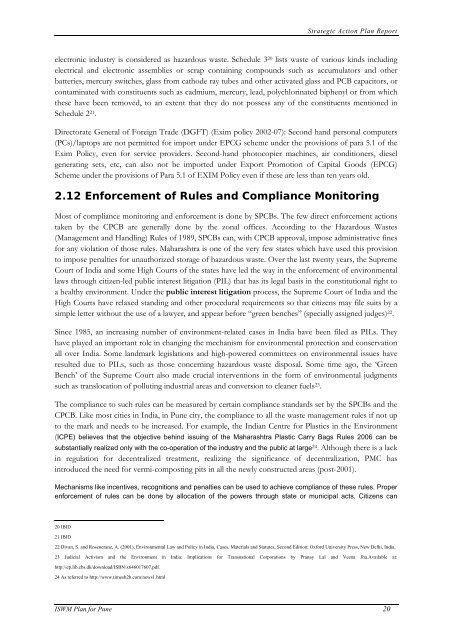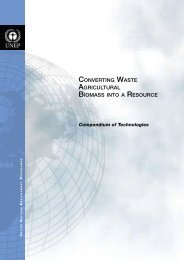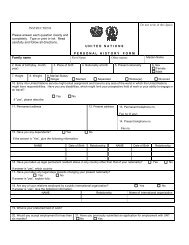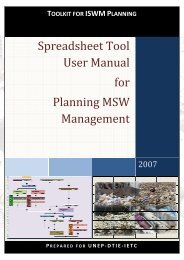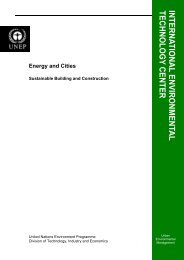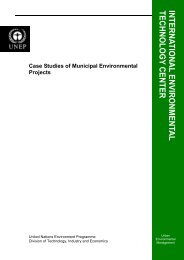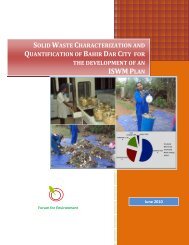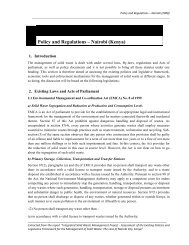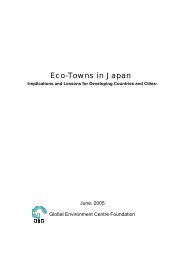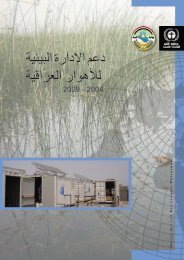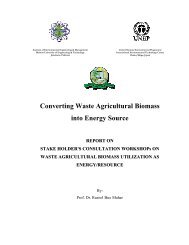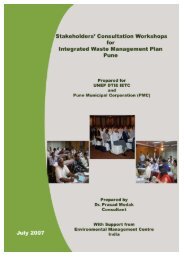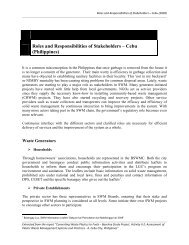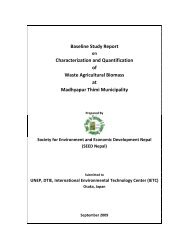Strategic Action Plan - International Environmental Technology Centre
Strategic Action Plan - International Environmental Technology Centre
Strategic Action Plan - International Environmental Technology Centre
You also want an ePaper? Increase the reach of your titles
YUMPU automatically turns print PDFs into web optimized ePapers that Google loves.
<strong>Strategic</strong> <strong>Action</strong> <strong>Plan</strong> Report<br />
electronic industry is considered as hazardous waste. Schedule 3 20 lists waste of various kinds including<br />
electrical and electronic assemblies or scrap containing compounds such as accumulators and other<br />
batteries, mercury switches, glass from cathode ray tubes and other activated glass and PCB capacitors, or<br />
contaminated with constituents such as cadmium, mercury, lead, polychlorinated biphenyl or from which<br />
these have been removed, to an extent that they do not possess any of the constituents mentioned in<br />
Schedule 2 21 .<br />
Directorate General of Foreign Trade (DGFT) (Exim policy 2002-07): Second hand personal computers<br />
(PCs)/laptops are not permitted for import under EPCG scheme under the provisions of para 5.1 of the<br />
Exim Policy, even for service providers. Second-hand photocopier machines, air conditioners, diesel<br />
generating sets, etc, can also not be imported under Export Promotion of Capital Goods (EPCG)<br />
Scheme under the provisions of Para 5.1 of EXIM Policy even if these are less than ten years old.<br />
2.12 Enforcement of Rules and Compliance Monitoring<br />
Most of compliance monitoring and enforcement is done by SPCBs. The few direct enforcement actions<br />
taken by the CPCB are generally done by the zonal offices. According to the Hazardous Wastes<br />
(Management and Handling) Rules of 1989, SPCBs can, with CPCB approval, impose administrative fines<br />
for any violation of those rules. Maharashtra is one of the very few states which have used this provision<br />
to impose penalties for unauthorized storage of hazardous waste. Over the last twenty years, the Supreme<br />
Court of India and some High Courts of the states have led the way in the enforcement of environmental<br />
laws through citizen-led public interest litigation (PIL) that has its legal basis in the constitutional right to<br />
a healthy environment. Under the public interest litigation process, the Supreme Court of India and the<br />
High Courts have relaxed standing and other procedural requirements so that citizens may file suits by a<br />
simple letter without the use of a lawyer, and appear before “green benches” (specially assigned judges) 22 .<br />
Since 1985, an increasing number of environment-related cases in India have been filed as PILs. They<br />
have played an important role in changing the mechanism for environmental protection and conservation<br />
all over India. Some landmark legislations and high-powered committees on environmental issues have<br />
resulted due to PILs, such as those concerning hazardous waste disposal. Some time ago, the ‘Green<br />
Bench’ of the Supreme Court also made crucial interventions in the form of environmental judgments<br />
such as translocation of polluting industrial areas and conversion to cleaner fuels 23 .<br />
The compliance to such rules can be measured by certain compliance standards set by the SPCBs and the<br />
CPCB. Like most cities in India, in Pune city, the compliance to all the waste management rules if not up<br />
to the mark and needs to be increased. For example, the Indian <strong>Centre</strong> for Plastics in the Environment<br />
(ICPE) believes that the objective behind issuing of the Maharashtra Plastic Carry Bags Rules 2006 can be<br />
substantially realized only with the co-operation of the industry and the public at large 24 . Although there is a lack<br />
in regulation for decentralized treatment, realizing the significance of decentralization, PMC has<br />
introduced the need for vermi-composting pits in all the newly constructed areas (post-2001).<br />
Mechanisms like incentives, recognitions and penalties can be used to achieve compliance of these rules. Proper<br />
enforcement of rules can be done by allocation of the powers through state or municipal acts. Citizens can<br />
20 IBID<br />
21 IBID<br />
22 Divan, S. and Rosencranz, A. (2001), <strong>Environmental</strong> Law and Policy in India, Cases, Materials and Statutes, Second Edition; Oxford University Press, New Delhi, India.<br />
23 Judicial Activism and the Environment in India: Implications for Transnational Corporations by Pranay Lal and Veena Jha.Available at:<br />
http://ep.lib.cbs.dk/download/ISBN/x646017607.pdf.<br />
24 As referred to http://www.timesb2b.com/news1.html<br />
ISWM <strong>Plan</strong> for Pune 20


